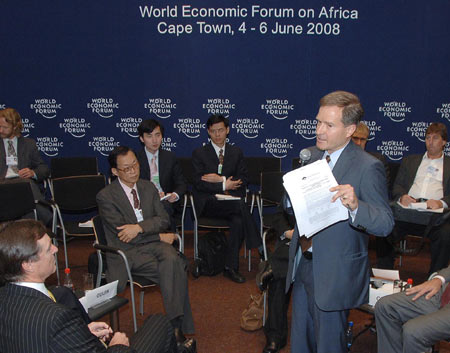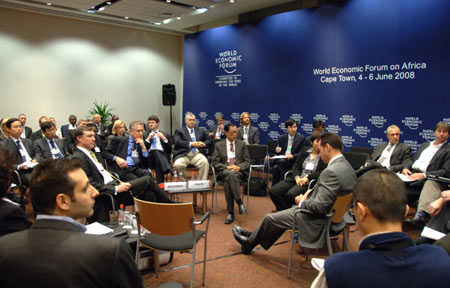China, Africa benefit from bilateral co-op
(Xinhua)
Updated: 2008-06-07 11:02
Updated: 2008-06-07 11:02
CAPE TOWN -- The cooperation between China and Africa in all sectors, based on mutual benefit, has been widely lauded at the just concluded 18th World Economic Forum on Africa in Cape Town, South Africa.
Hailing the beneficial cooperation between China and Africa, Liu Guijin, China's Special Envoy on African Affairs, said here on Friday that the cooperation between the two sides has brought concrete benefits and is in the interests of all concerned.
|
|
Based on the principle of mutual benefit, China has adopted effective measures to expand imports from African countries, which greatly boosted bilateral trade. And up to date, China has set up most preferential treatment relations with over 40 African countries and provided 28 least-developed African countries with zero tariff treatment, Liu said.
Chinese products, with high quality but also cheap, are welcome in the African markets, which have lowered local people's spending and helped curb local inflation, said the envoy.
China has launched large-scale infrastructure construction including roads, bridges, airports, housing, ports, hospitals and schools, alongside energy cooperation with African countries. Both China and Africa have agreed to put the concept of harmonious development into bilateral cooperation, which will serve as a model for international cooperation, according to him.
China-Africa cooperation has now expanded into the fields of agriculture, science and technology, personnel training, culture, medicine and finance.
China has set up 10 agricultural technology promotion centers in Africa and trained 100 agricultural experts and professionals. China also established 30 anti-malaria centers in the African countries, Liu added.
|
|
Besides trade and economic cooperation, cultural cooperation has gone smoothly between the two sides, including implementation of a large group of inter-governmental cultural exchange programs. Namely, the Confucius colleges and Chinese culture centers have been set up in many African countries, he said.
China and Africa has had a long-term good cooperation relationship which went back to the 1950s. Both sides have all along supported each other politically and economically, said He Wenping, director of African Studies Section of the Chinese Academy of Social Sciences, at the China-Africa cooperation seminar held by the World Economic Forum on Africa.
The cooperation between China and Africa is both effective and pragmatic. China has exempted a series of debts and tariffs for African countries and has set up development fund in the interests of African countries, said Harry G. Broadman, World Bank's economic advisor for the African region at the seminar.
China has offered bilateral aid to more than 40 African countries and set up most preferential treatment agreements with 20 African countries.
Facts proved that China is a sincere cooperation partner of Africa which places great hope on China, said Elisabeth Tankeu, commissioner of Trade and Industry of African Union, at the same occasion.
China proved African countries unreservedly with its development experiences and has trained 5,000 professionals from various fields. And China has also offered 2,700 scholarships to African youth. Some western media's criticism over China-Africa cooperation is totally groundless, said Tankeu.
China has all along adopted the peaceful and independent diplomatic policies and respected African countries, and never impose its own will on other countries, which should be valued, Tankeu said.
|
||
|
||
|
|
|
|

